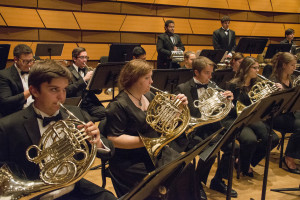Written by Samantha Bufmack
“The beautiful spring came; and when nature resumes her loveliness, the human soul is apt to revive also.” ~ Harriet Ann Jacobs
This novel expression about the absolute and utter beauty of the changing seasons reveals emotional changes every individual experiences. While the transition from winter to spring is a personal and internal shift, the Colorado State University Symphonic Band plans to capture it in its upcoming concert, Night Dreams, a program inspired by the drastic changes of moving from the darkness of winter to the abundance of spring. 
Director Richard Frey is thrilled to capture the different emotions that are correlated with the changing seasons through music on the March 2nd concert.
“I’m always struck by the different emotions that come from the shortest days of winter, the time when the trees are barren, the animals are tucked away, and often in our culture, a time we equate with death,” he said. “The beauty, of course, is that spring follows shortly thereafter, with the return of warmth, the reappearance of green dotting the landscape, and the sense of renewal that comes with the lengthening days.”
Three-part formula
If the words of Frey leave an impression of what to expect musically, honoring the hard work of the students should be an additional motive for attending the concert. Gregory Marxen, senior music education major and fourth horn in the ensemble, explains the three-part preparation formula. “It is individual preparation, small group work in sectionals, and lastly ensemble rehearsal time,” he said.
The band has dedicated copious amounts of effort to ensuring that the performance captures each composer’s intent. According to Marxen, Rest by Frank Tichelli “portrays each instrument as different colors that are at rest in the winter, and as the music continues on you see a colorful picture of spring coming to life.” Sojourn of Dreams by Kevin Walczyk is similar to Rest, where the rhythm moves forward, however, it has a more diverse sound, starting with a slower tempo, then speeding up drastically.
The third piece, Dreams in the Dusk by David Biedenbender, signifies the desire to turn back time and is Marxen’s favorite. “The range that the saxophone will be doing in this song is not something you typically hear in band music,” he explains.
The final work, Aurora Awakens, written by John Mackey, is the most picturesque, according to Marxen.
“It represents the magnificent story about the glowing colorful sky that the auroras create, while pushing the instruments to their full potential,” he said.
Guest artist solo
The high point of the concert’s aural picture will be the guest artist solo on Dreams in the Dust, the most modern of the pieces on the program, performed by Peter Sommer, coordinator of woodwinds and jazz studies and professor of saxophone at CSU. “I consider this to be the highlight of the concert because it demonstrates the great musicians that we have as professors,” said Marxen.
Capturing the emotional stages of winter to spring not only adds a unique aspect to this performance, but pushes the modern tone. Previous Symphonic Band performances have included older works that represent the timeless relevance of music, but this concert specifically features 21st century composers. “The use of modern pieces represents a transition of growth within the students and the band as a whole,” Marxen said. “While the seasons are changing and growing, so is each member of the band.”
On the night of the performance the audience can expect a brilliant presentation from over 60 instruments. There is no better way to say goodbye to winter and hello to spring.